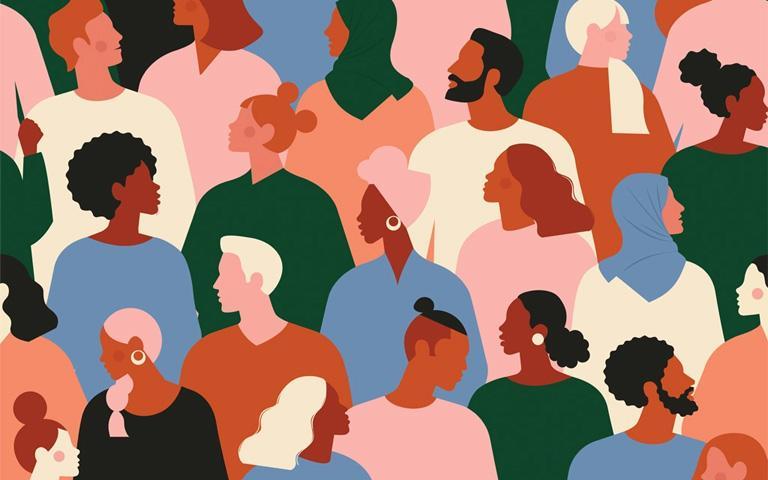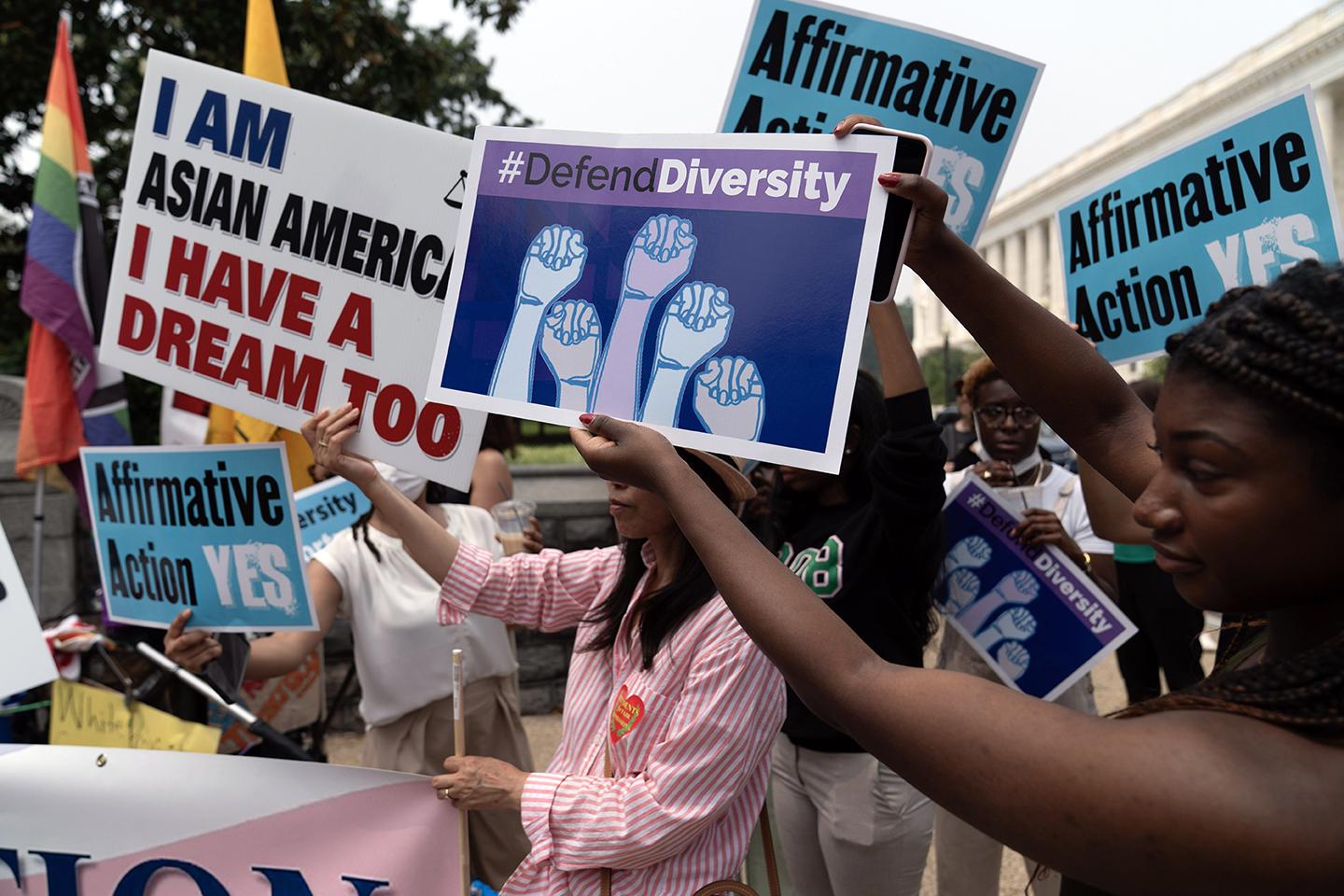The new affinity and alliance groups, which are piloting during the 2023-24 school year, work to maintain Country Day’s values as a school of diversity, equity, inclusion and belonging.
Coordinated by history teacher Christopher Arns, these groups hold meetings for high school students to share ideas, discuss experiences and organize activities.
Affinity groups hold meetings exclusively designated for students who share a certain identity.
“One of the points of an affinity group is solidarity so that people feel more comfortable in an environment where they feel like others are going to truly hear them and understand their shared experiences,” Arns said.
Students have the opportunity to participate in four affinity groups: Asian/Pacific American Students Association (APSA), Black Girls Society (BGS), Black Student Union (BSU) and Latinx & Hispanic Student Union (LHSU).
In addition, Gender & Sexuality Alliance (GSA), APSA, BSU and LHSU hold alliance meetings.
Alliance meetings are open to all students, regardless of identity. Those who attend the meetings despite not belonging to that identity are considered to be ally members.
“I think allies can be active bystanders and be vocal in providing their support about why affinity groups are helpful for everybody,” Arns said.
If students have any questions or concerns regarding the affinity and alliance groups, they should contact Arns.
Asian/Pacific American Students Association (APSA)
Asian/Pacific American Students Association (APSA) affinity and alliance meetings are designed to foster a sense of community among high school students from various Asian backgrounds.
As co-presidents, seniors Siri Atluri and Lauren Lu founded APSA with the help of senior Julie Tsoi as vice-president and middle school English teacher Gary Wong as adviser.
The group was originally run as only an alliance club during the 2022-23 school year, but has now branched out into an affinity group as well.
“The club version is a student alliance, so allies or people who aren’t Asian are still allowed to join,” Lu said. “But in the affinity group, it’s a safe space for only people who hold that identity.”
During affinity group meetings, discussions about identity and Asian-specific experiences often take place. Members are also able to get involved in planning events, including fundraisers.
“What’s really important is having a balance between a discussion-based approach and an action-based approach,” Atluri said.
Led by the student leaders, APSA members discuss many topics such as student life and Asian culture.
“It’s a space where we can have difficult conversations where we don’t necessarily have to walk on eggshells,” Wong said. “We can talk about difficult things because we all have this common trait.”
In addition to discussion-based meetings, APSA leaders and members also spend their time together planning fundraising events for various causes. Currently, the group has plans to fundraise for a non-profit organization called HairToStay.
HairToStay works to help cancer patients afford scalp cooling, which reduces hair loss from chemotherapy.
Through selling merchandise and hosting movie nights, APSA hopes to raise at least one thousand dollars in order to open a fund and allocate the money to the non-profit.
Along with fundraising events, APSA also plans activities for the purpose of increasing awareness of Asian culture.
“During Asian Pacific Islander Month, we want to put on more events,” Lu said. “We had an idea to build a playlist of Asian artists and have it play during snack time.”
No matter what is being done during an APSA meeting, the leaders always want there to be a sense of belonging and safety.
“That’s the thing about affinity groups,” Lu said. “Everyone shares the identity, so if you talk about something related to it, most people probably understand or share a similar experience.”
Black Girls Society (BGS)
Black girls on Country Day’s campus now have a safe space to talk about their experiences: the Black Girls Society (BGS) affinity group, founded by alumna Karabelo Bowsky, ’23.
Now led by seniors Imani Cochran and Annalucia King as co-presidents, BGS spreads collective belonging amongst Black girls on campus. The group is advised by Director of Advancement Rachelle Doyle and third grade teacher LaTeeka Bradford.
It’s important to create a welcoming and stress-free environment where members have a group to support each other, Cochran said.
“If you have struggles on campus, we have people to talk to,” she said. “We want to bring a sense of belonging and not feeling isolated on campus.”
Members of the group come together to talk about their shared experiences of being a Black girl.
“My goal as co-president with Imani is to help other Black girls on our campus feel unified,” King said.
Black Student Union (BSU)
The Black Student Union (BSU), a Country Day affinity and alliance group, was created to support and amplify the views and experiences of Black students.
BSU is led by co-presidents senior Imani Cochran and junior Sundiata Dumisani and advised by Director of Advancement Rachelle Doyle. They plan to meet monthly to celebrate, uplift and educate students on Black culture.
The group will help foster a feeling of connection to the school and fellow students, with activities both fun and meaningful.
Planned activities include Black Jeopardy, potlucks, spoken-word events and movie nights, with “The Color Purple” as one of the many possible movie selections.
BSU also provides students with a place to discuss events that some may have trouble processing by themselves.
For example, last school year, BSU discussed the racially-motivated 2022 mass shooting in Buffalo, N.Y.
“Sometimes we have days where we just need to talk about things that are going on. When the Buffalo shooting happened, I was overwhelmed. We had a day where we just sat there and got all that out,” Cochran said.
Cochran openly discusses her first experiences on campus when she frequently didn’t see other students with faces, or experiences, similar to her own.
“BSU has taken off a lot of that anxiety. A lot of the time you don’t feel heard or you don’t know if you should speak up about something, especially when you feel underrepresented. But I also want people to walk out of our meeting thinking, ‘Oh, I enjoyed myself today,’” Cochran said.
Students of all identities are invited to join the BSU alliance group.
“We want to make sure that everybody is educated. We want anybody who is interested to come,” Dumisani said.
Dumisani hopes for BSU to be more active this year.
“It’s important for every individual to be able to have someone who advocates for them,” Doyle said. “There are moments in life when we feel like we are not being seen and heard by people around us. It’s huge in terms of being a human being.”
Gender & Sexuality Alliance (GSA)
Once a month during flex, the Gender and Sexuality Alliance (GSA) group meets in room 8. Anyone who identifies with the LGBTQ+ community as well as allies are welcome to join.
The group is led by junior Ash LaPlaca and senior E Robinson as co-presidents, as well as sophomores Morgan Hansen and Claire Gemmell as co-vice presidents.
English teacher Jason Hinojosa, the GSA group’s adviser, attends meetings and helps facilitate the planning process.
During these alliance meetings, members are encouraged to share ideas on certain topics and participate in planned lessons.
“There are multiple prongs to the approach,” Hinojosa said.
GSA is not only a safe space for queer-identifying people to gather with others who identify but is also a learning opportunity for all.
“We have some educational meetings planned where students will teach on certain terms or vocabulary, famous queer people, that kind of thing,” Hinojosa said.
One of the lessons this year, taught by LaPlaca, went over what sexuality and gender identities mean.
“We taught about some lesser known identities to raise awareness a bit about just how many identities there are,” LaPlaca said.
In addition to lessons, GSA also gives students the opportunity to participate in various activities. Leaders of the club are planning on organizing field trips for members to attend later this school year.
“One place that we want to go to is the Lavender Library, which is an LGBTQ+ establishment in downtown Sacramento,” LaPlaca said.
In addition, GSA holds an annual Valentine’s Day fundraiser to raise money for their group. Anyone who wants to help can bake various goods to be sold to students and staff.
“The more students or faculty that show support, the more confidence we all feel in what we are doing and trying to achieve,” LaPlaca said.
Latinx & Hispanic Student Union (LHSU)
The Latinx and Hispanic Student Union (LHSU) affinity and alliance group, led by seniors Sylvia Valverde and Juliette Zúñiga as co-presidents, establishes an active Latinx and Hispanic student presence within the school community.
LHSU meets during flex on one Friday of every month. Meetings predominantly revolve around interactive discussions.
Valverde and Zúñiga’s vision is to expand membership, create a safe and culturally distinctive space and encourage greater engagement within the student body.
“There are so few Latinx people on campus. I want to ensure we have a voice,” Zúñiga said.
LHSU aims to create an environment where participants are drawn to the affinity group out of genuine interest rather than obligation.
At the same time, students should feel comfortable enough to share potentially vulnerable aspects of themselves, Zúñiga said.
Zúñiga emphasized the significance of creating a better campus environment for everyone.
“There are certain discussions that are more culturally based on your own experiences or something more personal,” she said. “I think it is important to have a safe space where you know that people will understand you.”
One topic that LHSU discussed during the group’s first meeting was microaggressions and how to handle them.
Microaggressions are small remarks that are targeted at a group of people who have a common identity. Although they can seem insignificant, they may ultimately lead to detrimental issues.
“We want to make sure that we crack down on that because we know the effects of microaggressions can be very harmful,” Valverde said.
Along with being taught by student leaders, the group is also keen on inviting guest speakers of Latinx or Hispanic descent who can share their personal experiences with the group. LHSU is also exploring the idea of hosting separate meetings focused on allyship — in which anyone can join — and have members actively participate in the group’s activities.
Alicia Perla, adviser of LHSU and director of college counseling, said her goal is to provide the group with experience, a mature perspective and a voice toward the faculty.
Perla aims to foster understanding among students, encouraging them to support one another and take an active role in ensuring that the entire community is represented.
When Valverde first started high school at Country Day, there was a noticeable absence of a robust Latinx and Hispanic presence, Valverde said.
“I know it is getting better as more generations come in,” she said. “I just want to make sure that there is a safe place for people to be able to talk. I want to strengthen the program for future generations.”


